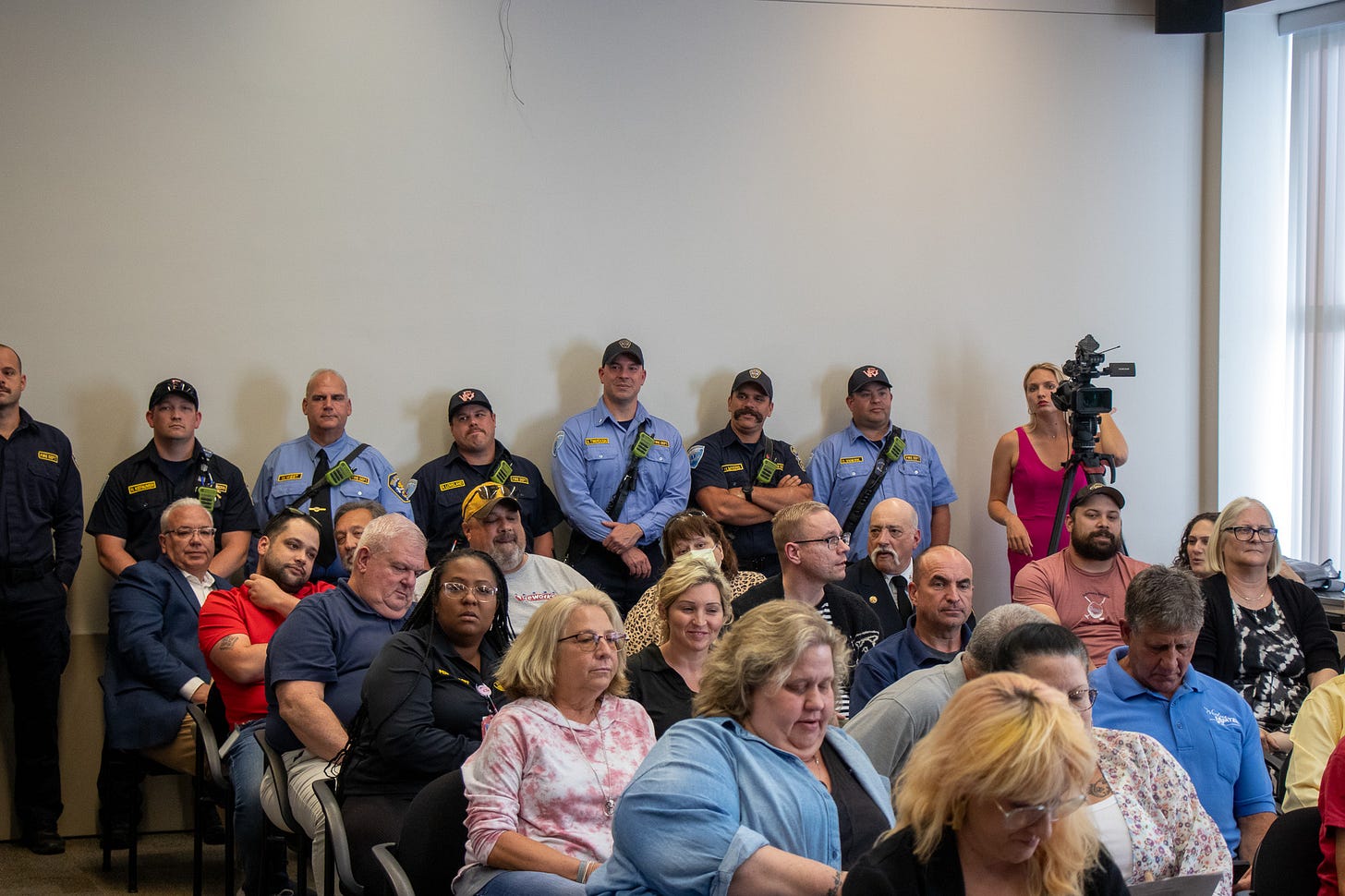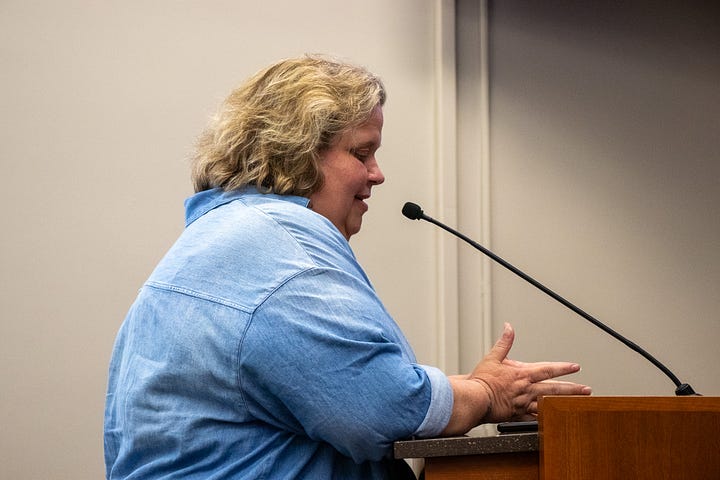Council Condensed: Homelessness, panhandling and commission controversy
Wheeling's city council held a series of meetings on Aug. 20 before a full chamber as citizens listened to discussions on homelessness, panhandling bans, the Clay School and other hot topics.
WHEELING – Council chambers filled to capacity on Tuesday, Aug. 20 as the city honored retiring employees, discussed potential panhandling bans and appointed—and didn’t reappoint—members to boards and commissions. In a rousing series of discussions, here are the major takeaways.

Seidler’s pitch to help the homeless…
During his council remarks, Councilor Ben Seidler said a lot of time, effort and money had been put into lifting people out of homelessness, but that more needed to be done to offer addiction and mental health services. “I fully believe at this point we have much less of a homelessness problem than we do an addiction and mental health problem,” Seidler said.
Seidler continued, saying the current efforts to consolidate people experiencing homelessness into one exempted camp location to better coordinate service was not working. He wants the city to take a new approach similar to one taken by Douglas County, Colorado.
Douglas County–which bans urban camping–created a task force in 2022 known as HEART, or the Homeless Engagement Assistance and Resource Team, where county-employees connect people experiencing homelessness with service providers. Seidler then showed a video from the Colorado county about the program.


During public comments, local activist Susan Hagan confronted Seidler about comments he in an Aug. 15 interview with WAJR—The Voice of Morgantown. IN that interview, Seidler said many of the Wheeling “[service] providers are activists with a lack of character and integrity who repeatedly speak false and half-truths.”
“When you make those comments…when you paint such a broad brush of these agencies, you affect a great many things that they do,” Hagan said. She said this includes their fundraising efforts. Hagan said the council may be confused about what service providers do. “Homelessness, for the majority of these agencies, is a very small part of what they do,” Hagan said. “They have a hundred other missions that they do.”
The refusal to reappoint…
Mayor Denny Magruder offered several new and returning appointments to various commissions. The Centre Market Commission will see one-time Ward 3 city councilor Melinda Koslik serve, and Commissioners Elissa Gross and Elisa Hickman were reappointed to the city’s Human Rights Commission.
John Culler was appointed to the Greater Wheeling Sports and Entertainment Authority. Culler had served the GWSEA for years, but saw his reappointment in 2023 stall after former mayor Glenn Elliott set his eyes on diversifying the members on city advisory panels.
The real story here was who didn’t get appointed.
Dr. Vincent DeGeorge served on the Human Rights Commission from 2022 to 2024. At an Aug. 21 HRC meeting, Magruder attended and accepted the group’s recommendation to reappoint three existing members to the commission–Gross, Hickman and DeGeorge; however, on the morning of city council, Magruder privately informed DeGeorge he would not be reappointed due to a lack of votes in his favor.
Speaking during the public comment period, DeGeorge suggested his non-reappointment was related to his efforts to push against the city’s urban camping ban.



DeGeorge was an outspoken opponent during the city’s unsuccessful October 2023 effort to displace an East Wheeling homeless camp and, later, their successful effort to impose a total ban on urban camping in the city. This put DeGeorge at odds with Seidler and then-Councilor Jerry Sklavounakis—the lead sponsors of the ban.
Continuing his comments and echoing concerns expressed by longtime former Human Rights Commissioner Diana Bell, DeGeorge accused the city of “hamstringing” the HRC by “injecting politics into it.” He claimed zero instances of discrimination had been addressed by the commission during his three-year term despite several complaints filed with the city.
“The Human Rights Commission—it’s very important [that it] operates independent from the city, especially without political interference,” DeGeorge said. “If the city, hypothetically, were to pass an ordinance that was discriminatory…it’s imperative that the Human Rights Commission be able to speak up and say ‘this is discriminatory.’”
Magruder, speaking after the meeting, said he had “changed his mind” on DeGeorge’s reappointment because he “didn’t have anywhere near the votes.” He said he didn’t want to “embarrass” someone by holding a failed vote on their appointment.
Each member of council was given the opportunity to provide comment on this story and whether they supported or opposed DeGeorge’s reappointment. No response was received.
The failure to reappoint DeGeorge to the Human Rights Commission may have a chilling effect on applications to board and commissions. If a person knows they could face retribution for doing what they think is best—even if it goes against the city council—that person may choose not to apply at all.
Development, Rules and Finance, oh my!
Councilor Ty Thorngate discussed a potential Private Outdoor Designated Area, or PODA, ordinance. The legislation would create areas in the city where residents could carry alcoholic beverages purchased from participating businesses and poured in designated PODA cups outdoors and between businesses.
Thorganate invited Delegate Shawn Fluharty to speak about PODA. Fluharty noted that no city that has enacted the program faced major issues since the state empowered municipalities to create the recreational zones. Thorngate went on to say this was a “launch[ing] point,” with potential legislation rolled out in Spring 2025.
A full story on the PODA discussion can be found here.
During a Rules Committee meeting, Seidler said he believed panhandling in the city amounted to a public safety hazard. He spoke of an alleged incident where a truck came within inches of another vehicle that stopped at a greenlight to speak with a person on the side of the road.
City manager Robert Herron and city solicitor Rosemary Humway-Warmuth said Wheeling was collaborating with the cities of Beckley, Charleston and Huntington, as well as Monongalia County, on a potential ban on panhandling that preserves people’s first amendment right to hold signs on the street.
While the intent of the legislation is to crackdown on panhandling, discussions were broad and could unintentionally increase penalties on jaywalking in a city with crumbling sidewalks, few crosswalks outside of downtown and numerous non-ADA compliant ramps and regular sidewalk obstructions.
Click here for a full story on the potential legislation.
The city manager gave his monthly financial report to the Finance Committee and members of council as the city ends its second month of the fiscal year. Herron says the report shows steady growth in the city, with revenue on track for the year and expenses slightly below predictions.
Questions were asked about the selection of a finance director–one of the few roles the city council hires and one that has sat empty for since April 2023. Herron said he and Magruder had a discussion about the position that day, with candidates being evaluated in the following weeks.
Clay School conversations…
Jim Ambrose of Tipping Point Real Estate Development gave an update on his company’s study regarding the Clay School and the financial impact rehabilitation or demolition would create.

A survey conducted by Tipping Point in 2023 saw over 1,000 responses. 50% of respondents suggested demolishing the building while 50% suggested rehabilitation. 73% hoped to see the building tied into the nearby 16th Street Soccer Field and several responses wished to see the Nelson Jordan Center relocate to the site.
Four scenarios were presented to council, with the first three involving private ownership and rehabilitating the building and the last involving public ownership. Each project would necessitate federal and state funding, as well as grants and private contributions.
Scenario one would see all recreation and community services expressed in the survey incorporated at a cost of $23 million. Scenario two offers a Nelson Jordan Center relocation and the construction of new housing at a cost of $23 million. Scenario three would see a Nelson Center relocation and a medical tenant at a cost of $24.5 million. Scenario four would be city-owned, involve demolition and reconstruction and could cost between $13.7 million and $24.1 million, depending on the structure’s size and use.
Ordinances and Resolutions…
City council approved new filter modules for the water treatment plant at a cost of $557,000, a lien on 20 Zane Street to recover costs expended to demolish it after the structure caught fire and retroactively approved the cost of two demolitions for $31,156 at 412 S Broadway Street and $69,800 at 4414 Wood Street. A Ford F-150 pickup truck was purchased at a cost of $47,365.50. No discussion occurred regarding the truck’s use.
During new business, council voted to expedite the approval process of an ordinance for the city’s excess liability workers’ compensation policy ($176,664.34) and the purchase of a recycling truck ($209,323) to be reimbursed by the West Virginia Department of Environmental Protection.
Thirteen resolutions saw unanimous support, including twelve facade grant applications.
The last resolution approved an agreement between the city and Toni DiCarlo for the use of parcels adjacent to 1125 Main Street–the temporary home to the downtown DiCarlo’s Pizza. DiCarlo’s will relocate here while the family finishes construction of their new building next door.
Wastewater treatment repairs continue…
Months after the Wheeling wastewater treatment plant experienced millions of dollars in damages after April flooding events, councilors are still working to approve the funds needed to pay for repairs.
Five more ordinances were approved with another three on the docket for council’s Sept. 3 meeting.
A lifetime of civil service…
During his report, the city manager recognized two long-time city employees who were entering retirement.


Chris Beiswinger worked with the city’s water department for 35 years and Assistant Fire Chief Paul Harto served with the Wheeling Fire Department for 38 years. Herron noted Harto likely did not want to retire, but, per W.Va. Code §8-22-25(d), was required to due to his age.
A heart for historic preservation…

Jeanne Finstein, speaking on behalf of Friends of Wheeling, urged city council during public comments to be more careful about the buildings they demolish. “We are concerned about the buildings we’re losing in Wheeling,” Finstein said. “We feel the city should offer a proactive approach to rehabilitate buildings before they have to be demolished.”
Finstein said she has a list of at least 18 people from 10 different states who have moved to Wheeling to rehab older buildings. “The fewer we have, the less opportunity there is there,” Finstein said. “We would like to do whatever we can to save these buildings. We love old buildings.”
Looking forward…
City council will hold their next meeting on Sept. 3 at 5:30 p.m. Before that, the Development Committee will meet at 4:30 p.m.



